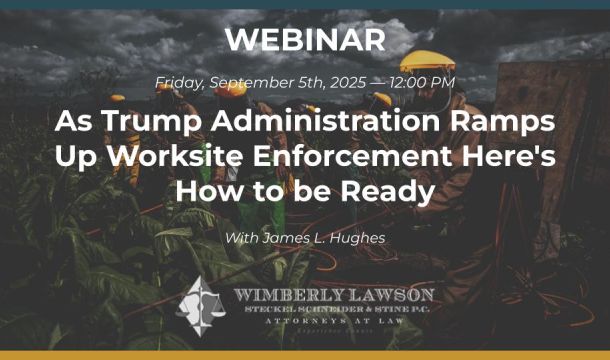Considerations When Government Officials Show Up and Request to Meet with Individual Employees
Occasionally, Immigration & Customs Enforcement (ICE) agents, or those from other state and local agencies, come to an employer’s facility asking to meet with one of more employees. The crucial issue is the extent to which agents can make entry with or without an arrest warrant, as someone at the employer’s premises must make a decision to allow or refuse entry. Various documents may be used by ICE officials, for example, including an ICE Warrant for Removal/Deportation (ICE Form I-205), and a DHS Warrant for Arrest of Alien (Form I-200). Neither of these forms requires the signature of a judge.
The issue thus is whether or not to permit the agents to make entry based on the document provided. Some employers may decide that agents possessing judicial warrants will be allowed to make entry, but those with administrative forms will not. It is suggested that employers determine in advance, as a matter of policy, whether to refuse law enforcement agents lacking the judicial warrant entry into non-public areas, as they do have a right of entry into the public areas. If an employer wishes to permit entry to non-public areas to those law enforcement agents having a judicial warrant, then the frontline employees need to be trained to recognize the difference between judicial warrants and the administrative forms, both search and arrest. However, employers must determine whether to refuse law enforcement agents possessing even arrest warrants entry into non-public areas, as the case law is not clear on this subject. In making this decision, the employer may wish to provide a written explanation to law enforcement officials, and possibly even a citation to cases, to discourage unnecessary conflict.
Some employers may feel they are not adequately protecting the "rights" of their own employees by granting such entry and the like. However, having a good relationship with ICE and other law enforcement agencies is also important. A practical result may be to cooperate with the authorities by sending the employee(s) to meet with the ICE or other law enforcement officials in the front office. Such tactic keeps the law enforcement officers out of sight in the work area and maintains cooperation with the law enforcement officers.
Indeed, ICE officials are increasingly making public statements that they consider a lack of cooperation an "obstruction of justice," an offense itself that can be the subject of prosecution. This writer suggests cooperation is the wiser choice for the employer.
This article is part of our May 2025 Newsletter.
View newsletter online
Download the newsletter as a PDF
Related Content
Get Email Updates

TPS Update (as of 2/6/2026)

Job Interviews Can Be a Good Selection Device

Suggestions on How to Diffuse a Tense Situation

Employers Blame Unions for Recent Shutdowns

$27 Million Verdict against Employer on Disability Discrimination over Refusal to Return Employee to Work



